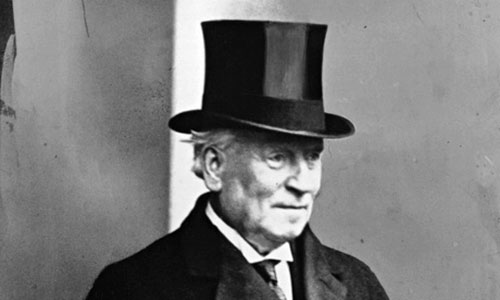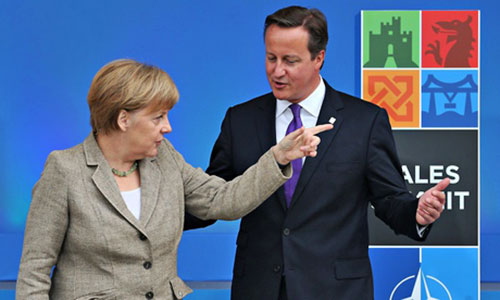Angela Merkel and David
Cameron:
too little detente.
Photograph: Peter Macdiarmid/PA
With every day that passes it gets easier to see how Britain might accidentally stumble into withdrawal from the European Union into a highly uncertain future by 2017.
More than that, with every passing day that the Eurozone fails to address its economic malaise and political paralysis, it becomes easier to imagine the EU's eventual break-up into… well, no one knows, but it will not be pretty.
Last week the Brussels commission sprung a surprise on David Cameron, though not on Treasury officials and diplomats, it seems, in the shape of that £1.7bn surcharge which Angela Merkel - and now Denmark's Mrs Borgen - say London must play by the rules and pay without complaint.
Apparently they don't realize that it can't do so without also gifting sackfuls of know-nothing votes to the UK Independence party.
No one's fault: just a triumph of bureaucratic rigidity of view over the creative juices of constructive statesmanship, one which will feed the Europhobic frenzy in Britain as similar disputes do across the EU 28. In similar fashion, all Wednesday's newspapers carry alarming and alarmist reports about immigration - much of it based on ignorance, as this Guardian analysis shows.
But the problem is real.
Millions of desperate and frightened people from beyond Europe seek to get here by fair means or foul, as the mayor of Calais's testimony to Westminster underlined again on Tuesday, and the response of the governing classes is woefully inadequate, as Mayor Natacha Bouchart also explained.
The media is no more coherent: faced with the drowning horrors in the Mediterranean (lorry horrors at Calais too), the liberal wing wants to let more in while also seeking to increase low wages which burden 5 million British workers and fuel Ukip's angst.
Yes, there is a connection, chaps, as Rafael Behr acknowledges here.
As for Fleet Street's oligarch media, it loves the foreign-billionaire London which helps price many of its readers out of the capital, despises poor migrants who keep the city going and plays footsie with Nigel Farage who is all mouth and very little trouser.
Skilled foreign workers, wealthy Chinese tourists and lucrative foreign students feel discouraged by compensatory xenophobic rhetoric and sharp words at street level - as the Archbishop of Canterbury reports.
Do other countries do better? It's patchy.
Spain is slowly recovering from the recession as Italy is not. Both are exposed to the Argentinean debt crisis as well as their own. France is looking towards President Marine le Pen as the Hollande regime fails to address deep economic problems via market-facing reform.
Germany's state banks are heavily indebted, but avoided the European Central Bank's (ECB's) recent stress test. The play-by-the-rules crowd rarely apply the rules against Germany - or France, whose budget now looks set to be nodded through in breach of those sacred rules.
Germany? Having near-bankrupted its Eurozone neighbors by its Wonga-style fiscal policy ("pay up or we send in the bailiffs") Germany's own export-orientated economy is finally faltering too.
The Great Recession is not over yet and looming Eurozone deflation - low growth and falling prices - may drag Britain's fragile recovery back down too.
Immigration? Chancellor Merkel scolds Cameron and insists on unfettered free movement of labour. But Britain's population has risen by 5 million since 2001 (see ONS figures here), primarily migration-driven, while Germany has 12% foreign-born but one of the lowest birth rates in the world.
On current trends, both countries are heading towards 70 million citizens - us up from 64 million, them down from 82 million - lots of them very elderly in both countries. We will learn which demographic graph proves the wise one in due course.
As in much else in 2014, it feels eerily like the prelude to the outbreak of war in 1914 must have felt.
Everyone knows something is terribly, dangerously wrong with the way we are conducting our collective affairs, woefully short-term in our responses, seeking safety by compromising on the basics - like a householder cancelling the fire insurance to save money.
Strong leadership?
The voters say they want it, but recoil from the real thing: look how they came to dislike and mistrust Margaret Thatcher and (formidable but a less substantial figure) Tony Blair when they tried to impose unpopular solutions for the long term.
They vote instead for weak government - as they did in Britain in 2010 and will again next May - then complain about the results, as they do across the channel where most ruling governments are bedeviled by the tactical imperatives of maintaining coalitions while keeping an eye on the best chance of breaking free at the next election.
Read Nick Watt's baleful account of last night's Commons maneuvers here - trading an EU referendum for concessions on the bedroom tax. Arggh...!
Spooked by Ukip, the prime minister is painting himself into an ever-smaller corner on EU renegotiation, on immigration, on the EU arrest warrant - and on the European Convention on Human Rights, which is not an EU matter at all.
It's not that Cameron is wrong on all particulars: Britain is proving too much of a magnet for eastern European migrants, the two European courts do make foolish and self-aggrandizing judgments, we could all benefit from more selective EU regulation, less can be more.
But Britain has mishandled immigration policy and procedure for decades without EU help. Here we go again today...
On top of which, Cameron's repeated failure at alliance-building in Europe, his willingness to blink rather than call Ukip's bluff, is craven. Who in sight would be better? I'll ring you back.
Is Merkel up to the important job of saving him from himself? It's beginning to look like No.
Despite rising bellicosity of language, I still don't believe Cameron wants to take Britain out. Nor do Boris Johnson, Philip Hammond and the other "Brexit" chancers.

Asquith: didn't want to go to
war.
Photograph: Hulton Archive/Getty Images
H.H. Asquith and Edward Grey didn't want to take us into war in 1914 either: they just drifted into it.
Merkel and Hollande have the same problem in reverse:
any sign of flexibility towards Britain ("Don't leave us alone with the French," a German MP begged a Tory conference fringe meeting) gives them domestic grief they can ill afford when Eurozone coherence is so fragile.
Disappointment and suspicion abound; the public mood is ugly.
Yes, the xenophobic sentiments have alerted sensible opinion and raised public support in Britain for the EU to its highest level for 30 years. But that could so easily be swept away by miscalculation and jingoism on both sides of the EU debate as Cameron's promised 2017 referendum looms, much as the peace party was swept aside in 1914.
The same goes for Europe if it can't shake off recession: a north-south split anyone?
It wouldn't matter quite so much - or so urgently - if external friends and foes did not detect weakness among the European partners.
The US, itself suddenly enfeebled, is less interested and less respectful. In Iraq Isis senses it can frighten Europe into passivity, as can Vladimir Putin, whose diplomatic skills repeatedly outshine the EU's - and not always for expansionary or malign purpose.
The other day the EU abandoned a case it was making at the World Trade Organization against China over allegedly illegal subsidies to makers of Chinese mobile phone network equipment. It's said that the Europeans were too divided and that Beijing has been picking them off singly with national concessions.
Too divided to negotiate together, too weak to negotiate alone? If we're not careful, that may be the future and it isn't a cheerful prospect.
Divided we fall.

